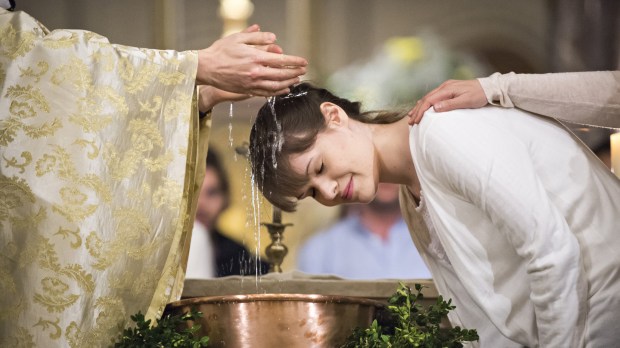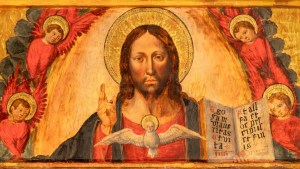It shouldn’t be surprising that the prayer Jesus taught his disciples is featured in the main sacraments of initiation, Baptism and Confirmation.
The Catechism of the Catholic Church explains how the Our Father is featured in these two sacraments:
In Baptism and Confirmation, the handing on (traditio) of the Lord’s Prayer signifies new birth into the divine life. Since Christian prayer is our speaking to God with the very word of God, those who are “born anew”. . . through the living and abiding word of God” learn to invoke their Father by the one Word he always hears. They can henceforth do so, for the seal of the Holy Spirit’s anointing is indelibly placed on their hearts, ears, lips, indeed their whole filial being.
CCC 2769
The Rite of Baptism of a Child features the Our Father in its liturgy, but this “handing on” of the Lord’s Prayer is more prominent in the OCIA (Order of Christian Initiation of Adults).
There is an entire liturgy that is often celebrated in the OCIA, typically during the season of Lent before a catechumen is baptized at the Easter Vigil.
Catechumens
In the liturgy (or sometimes during a Sunday Mass), the catechumens are given the Lord’s Prayer, which sometimes includes an actual scroll on which the Our Father is printed.
TeamRCIA explains on its website, “The reason for presenting the Lord’s Prayer is also crucial. ‘The Lord’s Prayer fills them with a deeper realization of the new spirit of adoption by which they will call God their Father, especially in the midst of the eucharistic assembly.’”
The handing on of the Our Father is a tradition that dates back to the early Church and many Christian writers at the time wrote about it:
This is why most of the patristic commentaries on the Our Father are addressed to catechumens and neophytes. When the Church prays the Lord’s Prayer, it is always the people made up of the “new-born” who pray and obtain mercy.
CCC 2769
The sacrament of Confirmation is a strengthening of the graces received at Baptism and adult catechumens always receive both sacraments at the same time at the Easter Vigil.
In this way, the Our Father is again recited at Confirmation, except now with renewed vigor, having received the gifts of the Holy Spirit.
The Lord’s Prayer plays a pivotal role in introducing a new Christian into the life they are now embarking on.



